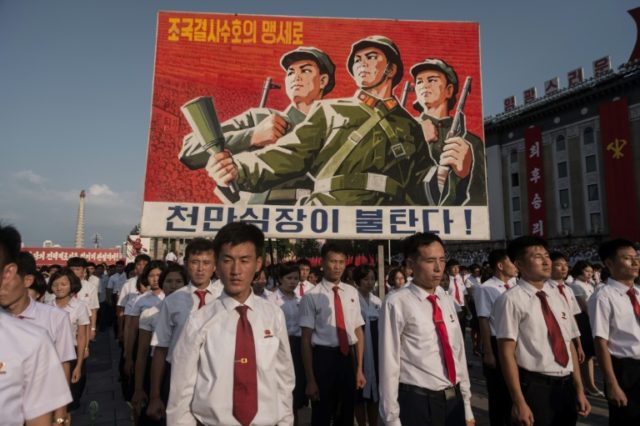The Associated Press reported on Monday that North Korea has canceled the biggest anti-American rally on its calendar: the annual “Victory in the Fatherland Liberation War” event that celebrates the defeat of “American imperialism” in the Korean War.
July 27 is evidently still a national holiday in North Korea, but this time it will not be marked with a month-long festival of hatred including 100,000 people marching in Kim Il-Sung Square, postage stamps showing a swarm of North Korean missiles annihilating the U.S. Capitol, or media statements urging resistance against “the fatty monster of U.S. imperialists.”
North Korea’s commemoration of the Korean War usually begins on June 25, which was the official starting date of the war in 1950. Last year, the ensuing month of “struggle” included constant tirades against the United States and its “puppets” in South Korea.
This year, Pyongyang’s media mouthpieces have yet to mention North Korea’s war opponents by name, vaguely referring to the “enemy” and encouraging faithful communists to continue their “struggle” without naming exactly which countries they are struggling against.
The Associated Press notes that North Korean media has been remarkably enthusiastic about reporting on the summit between dictator Kim Jong-un and U.S. President Donald Trump, but the coverage is “highly nuanced”:
So far, it hasn’t said much about what Washington is interested in the most – denuclearization. But it has made significantly fewer references to its need to have nuclear weapons than it was making last year, when Kim was test-launching long-range missiles at a record pace and tensions with Washington neared the boiling point.
North Korea’s decidedly less strident posture these days underscores the delicate position it finds itself in after decades of touting the United States as its archenemy.
State media referred to Trump quite deferentially in their reports of the summit, calling him by his full name and adding the title of president of the United States of America — itself a somewhat jarring contrast to the way it normally spits out merely the surname of U.S. officials, with no titles.
The AP adds that calling off this year’s anti-American hatefest is a relatively easy symbolic gesture for Pyongyang, but actually cleansing the country of propaganda against the United States would be a “Herculean task,” because it’s everywhere – posters, schoolbooks, political indoctrination centers, etc. Correspondents visiting Pyongyang have said anti-American propaganda became a bit less noticeable once diplomatic negotiations perked up and the Trump-Kim summit was scheduled.

COMMENTS
Please let us know if you're having issues with commenting.